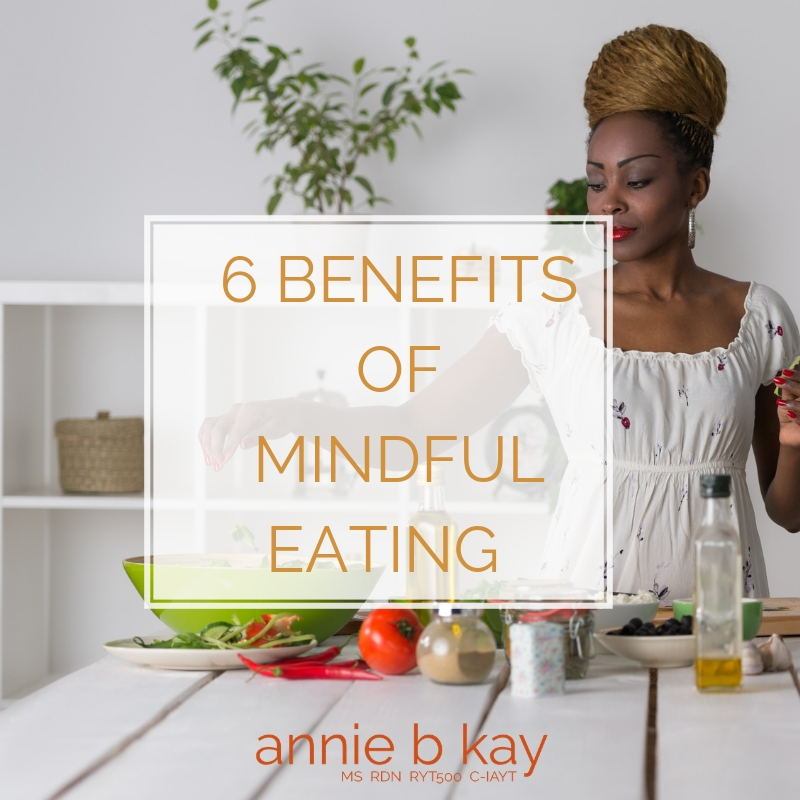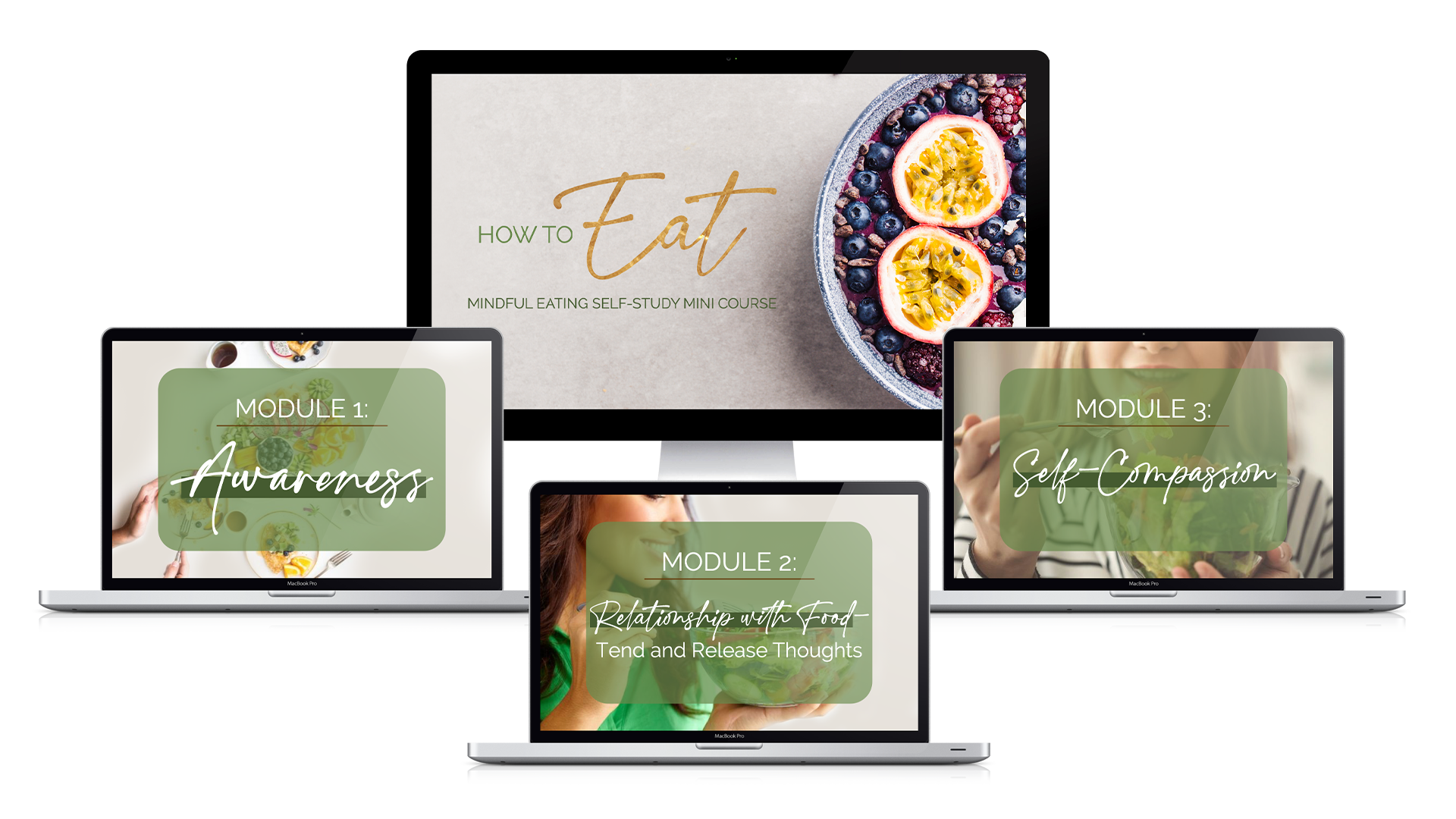Updated 10/12/2023
Mindful eating – using the tenets of mindfulness meditation while eating, has done nothing less than transform mind-body nutrition. Practitioners everywhere are incorporating it because it helps our clients change what they eat. Simple as that!
What is Mindful Eating?
Mindful eating is a type of meditation wherein you focus your attention on the sensory and other aspects of eating with an attitude of non-judgmental awareness. In essence, you slow down, eat with all five senses and stay curious about the process, about the food, and about your own relationship with food.
When I work with an individual, I almost always combine clear steps to bring food and lifestyle into balance (the what of lifestyle) with mindfulness (the how of lifestyle).
Since I’ve become a student of mindful eating myself, I enjoy my food more, often eat less, and am more satisfied. It takes longer to eat, (and to do the dishes as I really slow down), but I’m happier. Thich Nhat Hanh (who said he’s happier when he washes this teapot as though it were the baby Buddha or Jesus) is right.
The Science
The research community agrees that mindful eating is an effective tool. It can help promote a healthy natural weight (1) and curb destructive emotional eating (2). While the science is still young, it is evolving quickly – we are learning more about it all the time.
For emotional eating, mindful eating has been found to be most effective when combined with other behavior change techniques like coaching with a qualified nutrition professional. For effective weight management, again, mindful eating is most effective when it is done within a more comprehensive nutrition program and delivered by a well-trained professional.
6 Benefits of Practicing Mindful Eating
- Enjoying your food – First off, when people slow things down – and eating is a dramatic example – they tend to taste and enjoy their food more. It might seem ironic, but eating slowly is more interesting and enjoyable, once you get the hang of it.
- Epigenetic benefits – Epige-what? Epigenetics is the impact that choices have on gene expression. When you choose to eat a plant-based diet or move your body, you actually impact your gene expression, which in turn builds a more resilient future for you. It’s some of the biggest news in lifestyle medicine now.
- Neurobiology benefits – Mindfulness manages stress. When you slow down and breathe – particularly when you extend your exhale – you activate the whole rest-and-recover side of your nervous system. That not only manages stress but can improve digestion.
- Turn down the external messages on what and how much to eat. Face it, modern life is filled with messages from the media – commercials for fast food, billboards – it’s just everywhere. We are told we need to be eating basically all the time. It’s hard to ignore, but mindfulness can help you un-hook from those messages. That helps you to begin to find your own way.
- Tune in to your internal guidance system – instead of responding to cues from the outside, mindful eating gets you more in-tune with your internal guidance system – to if you are actually hungry, and when you are satisfied.
- Improve your relationship with what you eat. Eating is a two-way conversation. Mindfulness is an excellent way to tune in to the conversation. Beginning a mindful eating practice can bring up some uncomfortable aspects of your relationship with food. But, if you stay with it, keep your heart open as best you can, and practice compassionate self-observation, it can be a pathway to profound peace and self-compassion.
An Awareness and Caution
One caveat – this practice can uncouple eating and satiety. It can help you eat less, but it can also help you undercut your nutritional well-being if your emotional eating has evolved into a more serious condition like an eating disorder. This is not a practice to help you stop eating or to eat less than your body actually needs. But, it can be misused in this way. Don’t do it – it won’t end well for you. You can avoid that risk – here’s how.
In addition to mindfulness, use nutrition guidelines for adequacy – adequate protein and energy needs – for your body. For example, the National Academy of Medicine (NAM, formerly the IOM), a non-governmental nonprofit affiliated with the National Institutes of Health (NIH), which among other things tracks the research on dietary needs and creates recommendations, suggests that most humans need about 50 gm of protein to be reasonably healthy. I’ve found that a reasonable screen – is a starting place, for someone. A qualified nutritionist can help ensure that you are getting the nutrition you need to be who you want to be – strong, energetic, and healthy.
So How Do I Start?
Here is a free tip sheet to help you use mindful eating through the holidays.
Here’s another post: Mindful Eating: The Art & Science of Eating Better
Ready to practice? Check out my Mindful Eating Mini-course: How to Eat. Do it on your own, or bring me in to help.
References:
- O’Reilly GA, et al., Mindfulness-Based Interventions for Obesity-Related Eating Behaviors: A Literature Review, Obesity Reviews, Published online 2014 Mar 18. doi: 10.1111/obr.12156
- Katterman, Shawn, et. al., Mindfulness meditation as an intervention for binge eating, emotional eating, and weight loss: A systematic review, ScienceDirect – Eating Behaviors, Volume 15, Issue 2, April 2014, Pages 197-204, doi: 10.1016/j.eatbeh.2014.01.005





I think mindful eating focuses on what you eat, what you shop to eat, how much you eat, basically having complete control over your body & not getting easily distracted. I can agree with your point that mindful eating manages stress. It promotes a better digestion system and influences us to make wiser choices. I think everyone should practice this mindful eating as it also helps to ease down our anxieties.
Thank you for sharing this informative article with us. It will be quite helpful for the people who are looking for a change of pattern in their eating habits. I am looking forward to read more such content in the future.
Thanks Kobe. Yes I feel it’s a transformative practice – certainly is for me. All the best and Happy New Year!